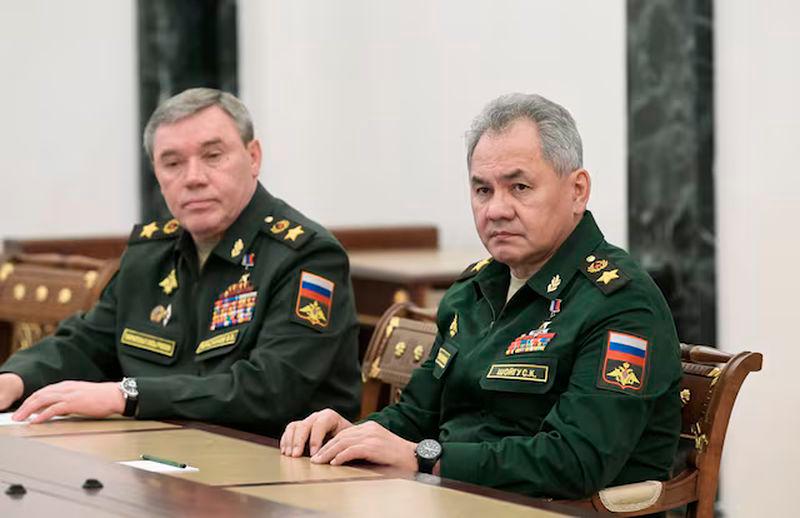THE HAGUE: The International Criminal Court issued arrest warrants for Sergei Shoigu, the former Russian defence minister, and leading Russian general Valery Gerasimov on Tuesday for alleged crimes committed during Russia’s invasion of Ukraine.
It brought to eight the number of arrest warrants issued against senior Russian suspects since Moscow sent troops into Ukraine in February 2022. They include Russian President Vladimir Putin, who faces charges over the deportation of Ukrainian children to Russia.
The court’s move was welcomed by Kyiv, but dismissed as legally meaningless by Moscow.
The Hague-based court said Shoigu and Gerasimov were suspected of having committed war crimes and crimes against humanity for directing attacks against civilians and civilian objects in Ukraine.
Judges had found there were “reasonable grounds to believe that the two suspects bear responsibility for missile strikes carried out by the Russian armed forces against the Ukrainian electric infrastructure” between Oct. 10, 2022 and at least March 9, 2023, the ICC said in a press release.
Russia, which is not a member of the ICC, has repeatedly said Ukraine’s energy infrastructure is a legitimate military target and denies targeting civilians or civilian infrastructure.
Ukraine is also not a member, but has granted the ICC jurisdiction to prosecute crimes committed on its territory since November 2013.
Kyiv applauded move to issue arrest warrants.
“Every criminal involved in the planning and execution of these strikes must know that justice will be served,“ Ukrainian President Volodymyr Zelenskiy said. “And we do hope to see them behind bars.”
Russia’s Security Council said the court’s action was part of a hybrid war against Moscow.
“This is just shooting the breeze, since the jurisdiction of the ICC does not extend to Russia, and was made as part of the hybrid war of the West against our country,“ state news agency TASS quoted the council as saying.
PUTIN ALLY
Shoigu has been a long-standing friend and ally of Putin and played a key role in the war. He was removed from his post of defence minister last month, and appointed secretary of Russia’s powerful Security Council, in the most significant changes Putin has made to his military command since the invasion.
Since the ICC has no police force of its own and relies on member states to make arrests, it is unclear if any of the Russian suspects will ever stand trial.
Russia has a policy of not extraditing its nationals and the ICC, the world’s first permanent war crimes court, has no provisions in place that would allow for in absentia trials.
During the timeframe mentioned in the latest warrants Russia is suspected of having carried out strikes against numerous electric power plants and sub-stations all over Ukraine.
According to ICC judges, there were reasonable grounds to believe the strikes targeted mostly civilian objects “and for those installations that may have qualified as military objectives at the relevant time, the expected incidental civilian harm and damage would have been clearly excessive to the anticipated military advantage”, making the attacks war crimes.
More specific details of the charges remain secret to protect witnesses and safeguard investigations, the court said.
CONNECTED CASES
In a statement ICC prosecutor Karim Khan said he applied for the warrants in February and case was connected to the warrants issued in March for top Russian commanders Sergei Kobylash and Viktor Sokolov, who also face charges over attacks on the power grid.
Khan said that investigations in Ukraine were continuing along multiple, interconnected lines.
One of his top Ukraine investigators, Brenda Hollis, told journalists earlier this month that the ICC’s Ukraine investigation is now looking into to crimes committed in detention against prisoners of war and civilians.
The ICC has come under scrutiny in recent months after ICC prosecutor Karim Khan announced he was seeking arrest warrants for Israeli Prime Minister Benjamin Netanyahu and his Defence Minister Yoav Gallant, as well as for three senior Hamas officials.
Some of the ICC’s vocal allies for its investigations in Ukraine such as Germany, Britain and the United States, have questioned the decision to seek warrants in that case. Most ICC member states, which include all of the European Union countries, have said they respect the independence of the court.
Washington, which is not an ICC member, has dismissed the move as “outrageous” and contests the court’s jurisdiction over the Israel-Hamas conflict, but continues to support the ICC’s Ukraine investigation.









